
By:
- Kristin Luciani
Published Date
By:
- Kristin Luciani
Share This:
UC San Diego Leads Discussion on Research Universities and the Future of America
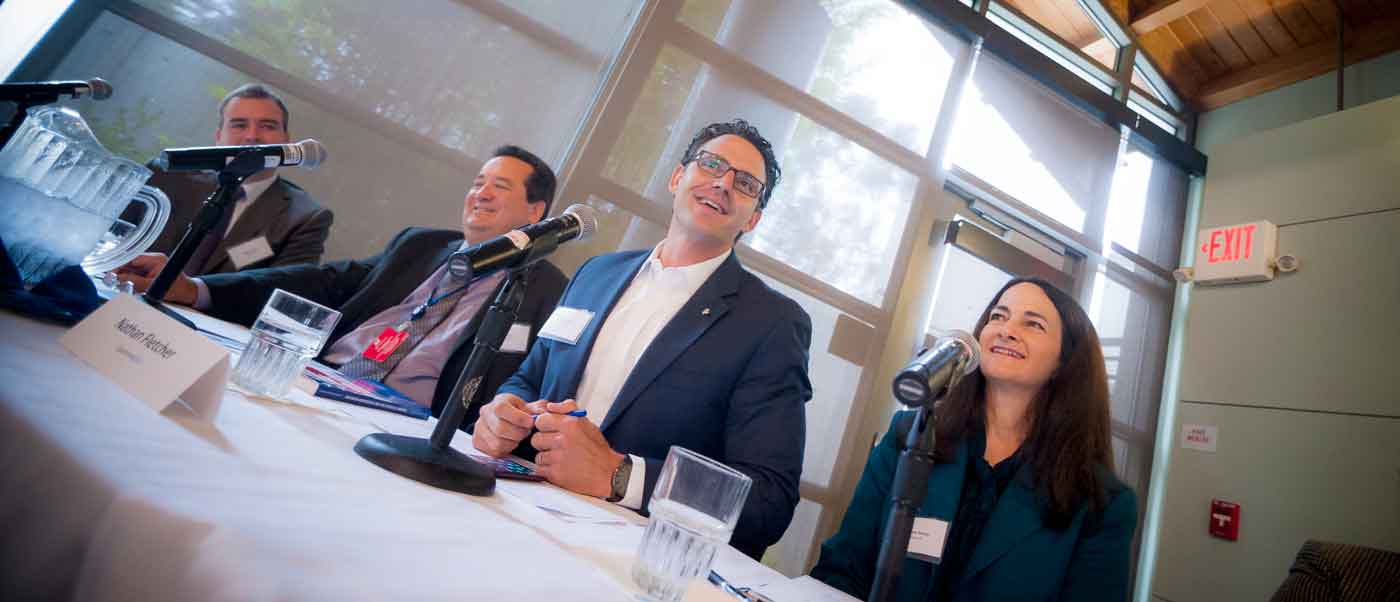
Photos by Erik Jepsen/UC San Diego Publications
Representatives from the National Research Council (NRC), UC San Diego leaders and key stakeholders from the San Diego region met Thursday to discuss the health and competitiveness of U.S. research universities. The meeting was one of nine forums the NRC is holding across the country to discuss recommendations proposed in its 2012 report, “Research Universities and the Future of America: Ten Breakthrough Actions Vital to Our Nation’s Prosperity and Security.” UC San Diego was the only university in California selected for a forum.
“This meeting happens at an opportune time for us because we are in the middle of our own strategic planning process,” said Chancellor Pradeep K. Khosla. “We have identified a framework for our plan that fits extremely well with what the NRC has recommended.”
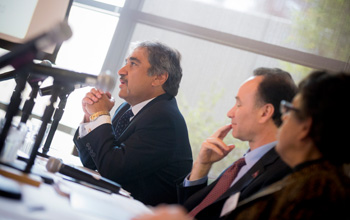
Chancellor Pradeep K. Khosla
The National Research Council is the principal operating agency of both the National Academy of Sciences and the National Academy of Engineering in providing services to the government, the public and the scientific community. It is also known for its rankings of research universities. In 2010, the NRC released its Data-Based Assessment of Research-Doctorate programs in the U.S. Three of UC San Diego’s doctoral programs were No. 1 in the country and 60 percent of the campus’s programs were ranked among the top 20 in their fields nationwide.
Thursday’s forum focused on three of the 10 NRC recommendations: strengthening partnerships with business, graduate education and STEM (Science, Technology, Engineering and Math) pathways, and strategic investment in university initiatives. Business, community and university leaders shared with the NRC what San Diego is currently doing in these areas, as well as ideas for future collaboration.
One example presented was President Obama’s BRAIN Initiative to chart the function of the human brain, for which UC San Diego has established the Center for Brain Activity Mapping. Ralph Greenspan, associate director of the Kavli Institute for Brain and Mind and the new center’s founding director, described the initiative as one of those rare events in history where the nation comes together to invest in a new technology that will have tremendous societal impacts. Government funding, industry partnerships, university research and private support are all invested in working toward the initiative’s goal.
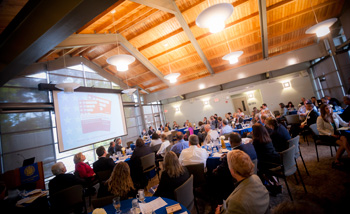
“It’s an idea and a program that has something for everyone,” said Greenspan. He explained how basic research and technological advances applied to the initiative will have significant impacts across society, from big data and network design to how we as a society learn and think about the brain and mind. He also noted the economic impact: “Major technological investments like this have great unforeseen economic returns.”
Chancellor Khosla, San Diego State University President Elliott Hirshman and Chancellor of the San Diego Community College District Constance M. Carroll shared programs in place to support students in STEM and in pursuing graduate education. Khosla pointed out UC San Diego programs such as CREATE (Center for Research on Educational Equity, Assessment and Teaching Excellence) and the newly established Chancellor’s Associates Scholarships as examples of initiatives that create access and opportunities for underrepresented students. Carroll emphasized the need for state and federal support of the “whole pathway,” from K-12 outreach to graduate school.
“The San Diego college ecosystem is an exemplar,” said Khosla. The panelists described for the NRC how the community colleges, San Diego State University and UC San Diego work together to build the workforce pipeline for the region, and beyond.
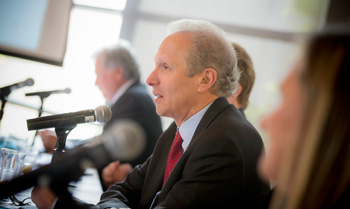
Ralph Greenspan
On the theme of industry partnerships, leaders from local companies such as General Atomics, Qualcomm and SPAWAR discussed their current research ties with UC San Diego and ideas for strengthening their collaborations. Panelists also stressed the important role of research universities in incubating new products and companies. They shared with the NRC success stories such as Qualcomm and Sapphire Energy, which have their roots at UC San Diego.
More than 150 companies in San Diego County have been founded by UC San Diego alumni, faculty and staff and the campus has an economic impact of more than $20 billion in the region alone, as stated in the campus’s most recent annual report.
“Without our university collaborations, we could not have made this possible,” said Tim Zenk, vice president of corporate affairs at Sapphire Energy, in describing the company’s path to success.
All agreed upon the need for industry, universities and government to work together to address the skills gap in the economy—that is, how to equip students with the skills that today’s companies need. Qualcomm co-founder and former UC San Diego professor Irwin Jacobs shared his vision for a “one year in, one year out” kind of program in which students alternate between learning in the classroom and in a local business.
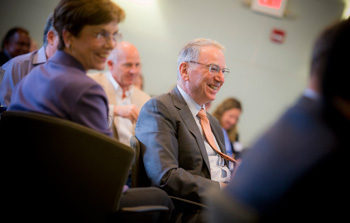
Irwin Jacobs
At the close of the forum, the panelists and invited guests were enthusiastic about continuing the conversation and working together to strengthen San Diego’s universities. “We are fortunate to have a local community—both individuals and companies—that show great support for the region’s universities,” said Khosla. “I believe that San Diego can be a model for other cities across the nation.”
In October, the NRC will hold a meeting in Washington, D.C. to discuss the outcomes of the nine regional meetings, including the information shared at UC San Diego. As stated in their report, “America’s research universities are today a key asset for our nation’s future. They are so because of the considered and deliberate decisions made in the past by policymakers, even in difficult times. Our future now depends on the willingness of our current policymakers to follow their example and make the decisions that will allow us to continue to compete, prosper and shape our destiny.”
Share This:
You May Also Like
Stay in the Know
Keep up with all the latest from UC San Diego. Subscribe to the newsletter today.


